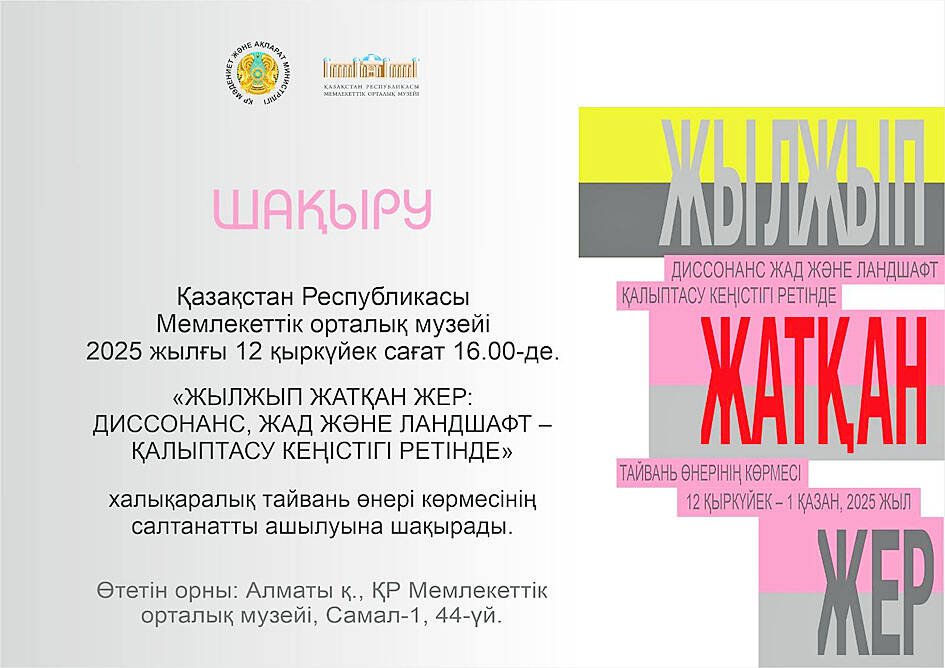The Ministry of Foreign Affairs (MOFA) yesterday condemned Beijing for what it called brutal interference in blocking an exhibition of Taiwanese art at the Central State Museum of the Republic of Kazakhstan earlier this month.
The exhibition, titled “Shifting Grounds: Dissonance, Memory, and Landscape as a Site of Becoming,” was curated by Wang Chun-chi (王俊琪) and featured works by eight Taiwanese artists, including Chen Yung-hsien (陳永賢).
It was scheduled to run in Almaty from Sept. 12 to Wednesday next week under the label “Taiwan Contemporary Art Exhibition.”

Photo: Screen grab from the Internet
However, under Chinese pressure, the museum abruptly announced that it would begin a one-month renovation on Sept. 11, canceling the exhibition and terminating the contract, MOFA said.
Taiwan’s representative office in Moscow learned of the situation on Sept. 10 and immediately contacted the museum, asking whether the renovation could be delayed.
The museum responded that the exhibition had been added at short notice and apologized for the scheduling conflict, the ministry said.
MOFA said it was unreasonable for the museum to abruptly cancel the exhibition after the artists had already arrived in Kazakhstan, adding that “traces of China’s intervention were too obvious.”
“Art and culture exchanges should have been non-political, but China brutally interfered and hindered the arts and cultural activity,” the ministry said, adding that it strongly condemns China’s action and expresses deep regret that the exhibition organizer had succumbed to China’s pressure.
While Beijing continues to suppress Taiwan in the international community, the ministry said it remains committed to defending the nation’s international space, and would deepen exchanges and cooperation with other countries to build global support and understanding of Taiwan.
The statement came after protesters waving People’s Republic of China (PRC) flags gathered outside the National Museum of the Czech Republic in Prague on Sept. 11, the opening day of the first exhibition of artifacts from Taiwan’s National Palace Museum at the venue.
China’s Taiwan Affairs Office denounced the exhibition as an attempt to promote “cultural Taiwanese independence” and “de-Sinicization” of Taiwan.
Democratic Progressive Party Legislator Michelle Lin (林楚茵) said Beijing has never stopped seeking to oppress Taiwan, even in the realm of arts and cultural exchange.
The exhibition in Prague emphasized “international exchange and Zhonghua [中華, Chinese] culture,” which had nothing to do with Taiwanese independence, she said.
China is deliberately planning to annex and eliminate the Republic of China (ROC), she said.
The Chinese Communist Party’s approach has evolved, including dispatching people to wave PRC flags at Taiwanese exhibitions in countries where it cannot force cancelations, to confuse local residents that Taiwan belongs to the PRC, she said.
National Cheng Kung University political science professor Hung Chin-fu (洪敬富) said that culture, sports and art should transcend national borders, yet China politicizes them and labels such events as efforts at “cultural Taiwanese independence” and uses “wolf-warrior diplomacy” to suppress Taiwan’s international space.
China’s actions are barbaric and would not win respect in civilized societies, he said.
Additional reporting by Chen Fu-yu

CHAOS: Iranians took to the streets playing celebratory music after reports of Khamenei’s death on Saturday, while mourners also gathered in Tehran yesterday Iranian Supreme Leader Ayatollah Ali Khamenei was killed in a major attack on Iran launched by Israel and the US, throwing the future of the Islamic republic into doubt and raising the risk of regional instability. Iranian state television and the state-run IRNA news agency announced the 86-year-old’s death early yesterday. US President Donald Trump said it gave Iranians their “greatest chance” to “take back” their country. The announcements came after a joint US and Israeli aerial bombardment that targeted Iranian military and governmental sites. Trump said the “heavy and pinpoint bombing” would continue through the week or as long

TRUST: The KMT said it respected the US’ timing and considerations, and hoped it would continue to honor its commitments to helping Taiwan bolster its defenses and deterrence US President Donald Trump is delaying a multibillion-dollar arms sale to Taiwan to ensure his visit to Beijing is successful, a New York Times report said. The weapons sales package has stalled in the US Department of State, the report said, citing US officials it did not identify. The White House has told agencies not to push forward ahead of Trump’s meeting with Chinese President Xi Jinping (習近平), it said. The two last month held a phone call to discuss trade and geopolitical flashpoints ahead of the summit. Xi raised the Taiwan issue and urged the US to handle arms sales to

BIG SPENDERS: Foreign investors bought the most Taiwan equities since 2005, signaling confidence that an AI boom would continue to benefit chipmakers Taiwan Semiconductor Manufacturing Co’s (TSMC, 台積電) market capitalization swelled to US$2 trillion for the first time following a 4.25 percent rally in its American depositary receipts (ADR) overnight, putting the world’s biggest contract chipmaker sixth on the list of the world’s biggest companies by market capitalization, just behind Amazon.com Inc. The site CompaniesMarketcap.com ranked TSMC ahead of Saudi Aramco and Meta Platforms Inc. The Taiwanese company’s ADRs on Tuesday surged to US$385.75 on the New York Stock Exchange, as strong demand for artificial intelligence (AI) applications led to chip supply constraints and boost revenue growth to record-breaking levels. Each TSMC ADR represents

State-run CPC Corp, Taiwan (CPC, 台灣中油) yesterday said that it had confirmed on Saturday night with its liquefied natural gas (LNG) and crude oil suppliers that shipments are proceeding as scheduled and that domestic supplies remain unaffected. The CPC yesterday announced the gasoline and diesel prices will rise by NT$0.2 and NT$0.4 per liter, respectively, starting Monday, citing Middle East tensions and blizzards in the eastern United States. CPC also iterated it has been reducing the proportion of crude oil imports from the Middle East and diversifying its supply sources in the past few years in response to geopolitical risks, expanding